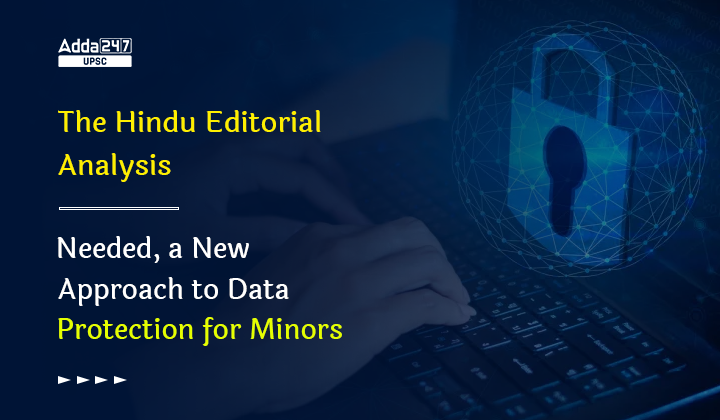Table of Contents
The Hindu Editorial Analysis
The editorial analysis of The Hindu Newspaper Editorial Articles aimed at simplifying various concepts relevant to the UPSC and other State PSC Exams. The Editorial Analysis helps in expanding the knowledge base as well as framing better quality mains answers.
Digital Personal Data Protection for Minors
- There are many gaps in the proposed draft Digital Personal Data Protection (DPDP) Bill, 2022 when it comes to the Data Protection of Minors.
Gaps in Digital Personal Data Protection (DPDP) Bill for Minors
- Parental Consent Provision: The draft Digital Personal Data Protection (DPDP) Bill, 2022 currently provides for mandatory parental consent for all data processing activities by children, defined as any person aged under 18 years.
Issue with Parental Consent
- Instead of incentivising online platforms to proactively build safer and better services for minors, the Bill relies on parents to grant consent on behalf of the child in all cases.
- In a country with low digital literacy, where parents in fact often rely on their children (who are digital natives) to help them navigate the Internet, this is an ineffective approach to keep children safe online.
Conformity with International Standards
- It does not take into account the “best interests of the child”. It is a standard originating in the Convention on the Rights of the Child, 1989, to which India is a signatory.
- India has upheld this standard in laws such as-
- The Commissions for Protection of Child Rights Act, 2005,
- The Right of Children to Free and Compulsory Education Act, 2009, and
- The Protection of Children from Sexual Offences Act, 2012.
Lack of Clarity over Use of Social Media Platforms
- The Bill does not factor in how teenagers use various Internet platforms for self-expression and personal development and how central it is to the experience of adolescents these days.
- From taking music lessons to preparing for examinations to forming communities with people of similar worldviews, the Internet is a window to the world.
- While the Bill does allow the government to provide exemptions in the future from strict parental consent requirements, profiling, tracking prohibitions, etc.
- This whitelisting process does not acknowledge the blurring lines between what a platform can be used for.
- For example, Instagram is, strictly speaking, a social media platform, but is regularly used as an educational and professional development tool by millions of artists around the world.
Concerns over Verifiability of Parental Consent
- Another issue in the current draft of the DPDP Bill is that each platform will have to obtain ‘verifiable parental consent’ in the case of minors.
- This provision, if enforced strictly, can change the nature of the Internet as we know it.
- Since it is not possible to tell if the user is a minor without confirming their age, platforms will have to verify the age of every user.
- The government will prescribe later whether verifiability will be based on ID-proof, or facial recognition, or reference-based verification, or some other means.
Way Forward
Following steps are needed to avoid the folly of treating un-equals equally and blocking off access to the Internet for teenagers.
- Avoid Blanket Ban: we should move from a blanket ban on tracking, monitoring, etc. and adopt a risk-based approach to platform obligations.
- Effective Risk Assessment: Platforms should be mandated to undertake a risk assessment for minors.
- They should not only perform age-verification-related corresponding obligations but also design services with default settings and features that protect children from harm.
- This approach will bring in an element of co-regulation, by creating incentives for platforms to design better products for children.
- Relaxing the Age for Parental Consent: we need to relax the age of mandatory parental consent for all services to 13 years in line with many other jurisdictions around the world.
- This will minimise data collection, which is one of the principles that the Bill is built on.
- It is in tandem with the risk mitigation approach elucidated above which will achieve protection for children online while allowing them access.
- Large Scale Survey: Indian government should also conduct large-scale surveys of both children and parents to find out more about their online habits, digital literacy, preferences and attitudes.
Conclusion
- India must design a policy that balances the safety and the agency of children online. Onus of keeping our young safe should not only be on parents, but instead it should be a society-wide obligation.
The Issue Of Fact Checking By PIB: The Hindu Editorial Analysis
The Issue Of Fact Checking By PIB: The Hindu Editorial Analysis



 TSPSC Group 1 Question Paper 2024, Downl...
TSPSC Group 1 Question Paper 2024, Downl...
 TSPSC Group 1 Answer key 2024 Out, Downl...
TSPSC Group 1 Answer key 2024 Out, Downl...
 UPSC Prelims 2024 Question Paper, Downlo...
UPSC Prelims 2024 Question Paper, Downlo...





